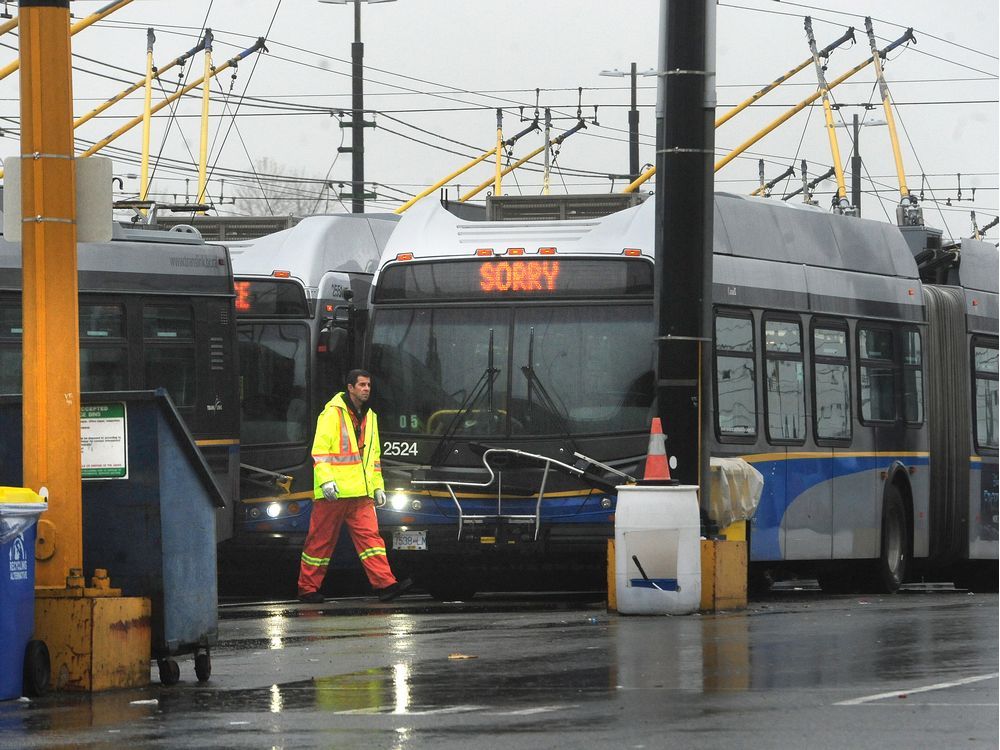Hundreds of trips cancelled as Metro bus overtime ban enters second day

Credit to Author: Jennifer Saltman| Date: Mon, 18 Nov 2019 23:31:25 +0000
Delays and trip cancellations continued across Metro Vancouver’s bus system on Monday as drivers refused to work overtime for a second day, as the transit workers’ strike entered its third week.
Drivers first turned down overtime on Friday, which led to the cancellation of about five per cent of bus runs, with trips cancelled across Metro, with the city of Vancouver hardest hit.
Hundreds of bus trip cancellations were listed under TransLink’s service alerts on Monday morning, however it’s unclear how many of them were directly related to the strike. It’s difficult to predict which routes and areas will suffer delays and cancellations, because decisions are made in each of the region’s six depots, and adjustments are constantly being made.
“It’s just rearranging service so it has the least impact possible that’s what happen up to the minute very day,” said TransLink spokesperson Jill Drews.
The move came after talks between Unifor, which represents 5,000 bus drivers, maintenance workers and SeaBus workers, and Coast Mountain Bus Company broke off for a second time last week.
Unifor’s western regional director, Gavin McGarrigle, said it was his understanding that the disruptions were widespread on Monday and the Vancouver depot was again the hardest hit area, along with Port Coquitlam and Hamilton, which serves Richmond.
“Our members are telling me that the effect is across every depot in the system, that there are bus interruptions, bus delays, bus cancellations, and it’s only going to continue on Wednesday and Friday,” McGarrigle said.
The driver overtime ban is on top of drivers refusing to wear their uniforms and maintenance workers not working overtime, which began on Nov. 1.
There have been 164 SeaBus sailing cancellations to date — including 12 on Monday — because of the overtime ban by maintenance workers, and bus maintenance is taking longer to complete.
Transit users are encouraged to allow for extra time in their commutes and check transit alerts or TransLink’s social media for updates.
If talks remain stalled, McGarrigle said the union will consider what action it will take next and let the public know later this week or early next week. This could include an escalation of the overtime ban, refusing to collect fares, working to rule, a sporadic strike (such as a one-day system shutdown) or a rotating strike that affects one depot or one work area at a time.
“We’ve not finalized any decisions yet, but we’re certainly looking ahead. We’ve been very clear that these issues are not going away unless they are addressed at the table, and we are prepared to escalate as needed,” McGarrigle said.
Wages are the main issue in bargaining.
Coast Mountain has offered a 12.2-per-cent pay increase for skilled trades over four years, and a 9.6-per-cent pay increase for transit operators over the same period. Unifor had sought an increase of 15.2 per cent over four years for bus drivers and 16.7 per cent over four years for maintenance workers, and parity with drivers in other jurisdictions and maintenance workers within the transit authority.
Under the current contract, conventional bus drivers start at $22.83 an hour during a 30-day training period, then go from $24.46 an hour to $32.61 an hour after 24 months of employment. Benefits include medical, vision and dental, a pension plan and family bus passes.
On the issue of working conditions for bus drivers, the company offered, for the first time, guaranteed recovery time. Drivers would receive 40 minutes of recovery time per shift or be paid double time for every minute of the recovery time missed because of traffic congestion.
Both sides have said they are too far apart to continue bargaining, and no further talks are scheduled.
McGarrigle said the union and the company are still in regular contact, but the union won’t return to bargaining without a better offer.
“At the end of the day, we still have outstanding discussions about working conditions, wages and really overall contract fairness. The company knows exactly what those issues are, our members know what the issues are, and they’ve given us a strong mandate to go and get them fixed,” McGarrigle said.
Drews said the company is willing to negotiate, with or without a mediator.
“Ultimately, we don’t want customers caught in the middle of this and think it’s better to get back to the table and discuss wages more deeply,” Drews said.